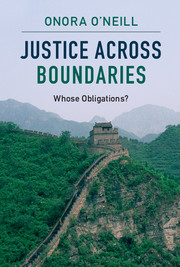Book contents
- Frontmatter
- Contents
- Acknowledgements
- Introduction
- Part I HUNGER ACROSS BOUNDARIES
- Part II JUSTIFICATIONS ACROSS BOUNDARIES
- Part III ACTION ACROSS BOUNDARIES
- 8 From Edmund Burke to twenty-first-century human rights: abstraction, circumstances and globalisation
- 9 From statist to global conceptions of justice
- 10 Global justice: whose obligations?
- 11 Agents of justice
- 12 The dark side of human rights
- Part IV HEALTH ACROSS BOUNDARIES
- Index
11 - Agents of justice
from Part III - ACTION ACROSS BOUNDARIES
Published online by Cambridge University Press: 05 February 2016
- Frontmatter
- Contents
- Acknowledgements
- Introduction
- Part I HUNGER ACROSS BOUNDARIES
- Part II JUSTIFICATIONS ACROSS BOUNDARIES
- Part III ACTION ACROSS BOUNDARIES
- 8 From Edmund Burke to twenty-first-century human rights: abstraction, circumstances and globalisation
- 9 From statist to global conceptions of justice
- 10 Global justice: whose obligations?
- 11 Agents of justice
- 12 The dark side of human rights
- Part IV HEALTH ACROSS BOUNDARIES
- Index
Summary
Cosmopolitan principles and state institutions
Many of the best-known conceptions of justice are avowedly cosmopolitan – when considered in the abstract. They propose basic principles of justice that are to hold without restriction. Whether we look back to Stoic cosmopolitanism, to medieval natural law theory, to Kantian world citizenship or to twentieth-century theory and practice – John Rawls and the UN Universal Declaration of Human Rights of 1948, for example – the scope of principles of justice is said to be universal or cosmopolitan, encompassing all humans. As is well known, such principles have been compromised in various ways, for example by the exclusion or partial exclusion of slaves, women, labourers or the heathen from the scope of justice; these exclusions have been a focus of much debate, and recent cosmopolitan conceptions of justice have condemned them.
However, there are other less evident exclusions created by the commonplace assumption that cosmopolitan principles are to be instituted in and through a system of states. Many recent challenges have argued that the exclusions that borders create are further injustices, and that they should be addressed by abolishing borders, or at least by reducing the obstacles they present to movements of people, goods or capital. Some conclude that justice requires the construction of a world state; others that borders should be (more) open to the movement of peoples; others that powerful regional and global institutions can mitigate or redress inequalities that states and borders create. I am at least partly sceptical about those attempts to realise cosmopolitan principles by means of global institutions without showing what is to prevent global governance from degenerating into global tyranny and global injustice. Big may not always be beautiful, and institutional cosmopolitanism may not always be the best route to universal justice. It is worth exploring a more realistic, and also (I hope) a more robust view of the plurality of agents of justice that might play some part in institutionalising cosmopolitan principles of justice.
A plausible initial view of agents of justice might distinguish primary agents of justice with capacities to determine how principles of justice are to be institutionalised within a certain domain from other, secondary agents of justice. Primary agents of justice may construct other agents or agencies with specific competencies: they may assign powers to and build capacities in individual agents, …
- Type
- Chapter
- Information
- Justice across BoundariesWhose Obligations?, pp. 177 - 192Publisher: Cambridge University PressPrint publication year: 2016

